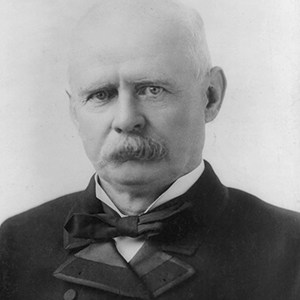Adlai E. Stevenson I served as the Vice President of the United States under Grover Cleveland. In 1900, he was nominated to serve again on a ticket with William Jennings Bryan, but lost the election to William McKinley and Theodore Roosevelt.
Early Life
Adlai Ewing Stevenson was born on Kentucky tobacco farm in 1835. After attending Illinois Wesleyan University, he studied law and was admitted to the Illinois bar in 1858. He was elected to his first major political office in 1874, when he represented Illinois as a Democrat in the House of Representatives.
Political Career
When Grover Cleveland became President in 1885, he named Stevenson First Assistant Postmaster General. In the position, Stevenson had control over the largest spoils system in the county, replacing more than 40,000 Republican postal workers with Democrats. He drew the ire of many Republicans and earned himself the nickname, “Headsman.”
In 1888, Cleveland appointed Stevenson to be an associate justice of the Supreme Court for the District of Columbia. However, the Republican-controlled Senate blocked his nomination as payback for his actions as First Assistant Postmaster General.
When Cleveland was re-nominated for President in 1892, Stevenson was selected as the Vice Presidential nominee in an effort to unite the Democratic Party. Most notably, Stevenson’s “soft-money” policy contrasted with Cleveland’s support for the gold standard. As Vice President, Stevenson’s role was largely ceremonial. However, in presiding over the Senate, he was known as moderate that favored bi-partisan compromise.
Later Career
Although he was briefly considered as the possible presidential nominee in 1896, he received limited support. Loyal to his party, Stevenson endorsed Democratic candidate William Jennings Bryan. Four year later, Stevenson was chosen to run for Vice President with Bryan, bringing both age and experience to the ticket. Nonetheless, the Democrats lost the Presidential election to McKinley and Roosevelt by a wide margin.
After losing the election, Stevenson returned to his law practice. He waged an unsuccessful bid for Illinois governor in 1908 and subsequently retired from politics.









